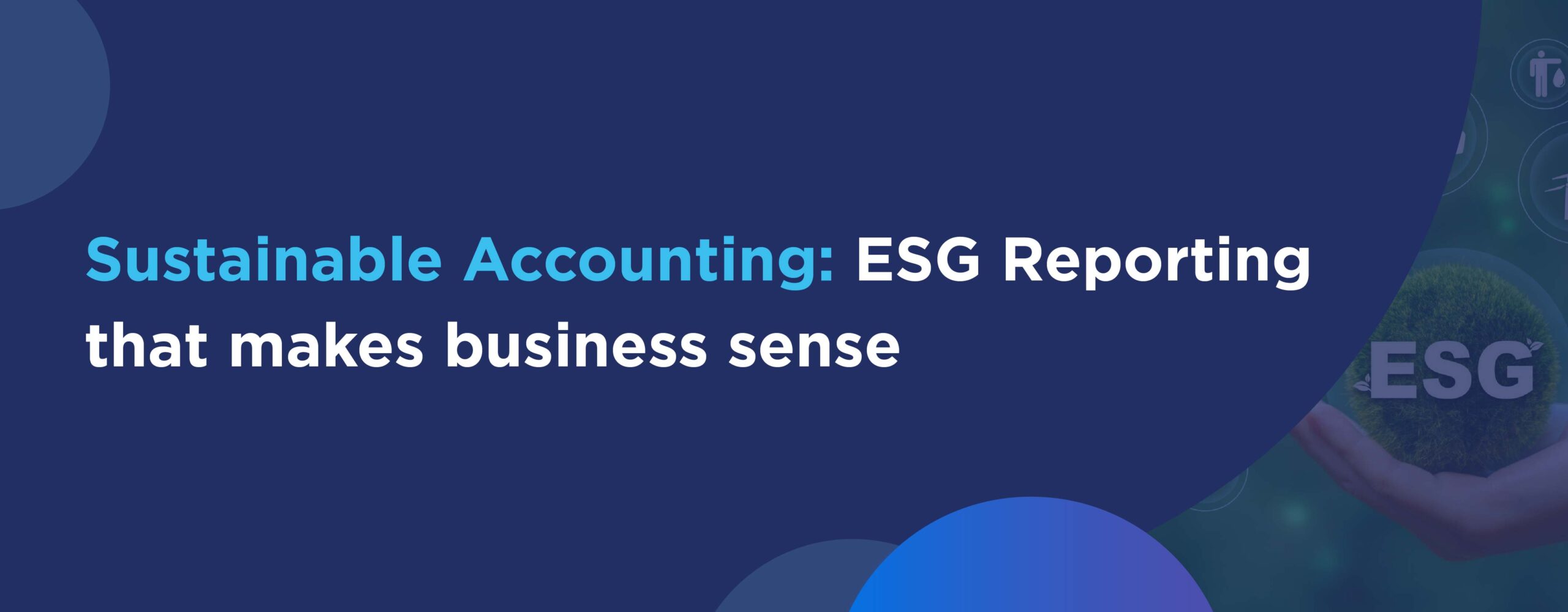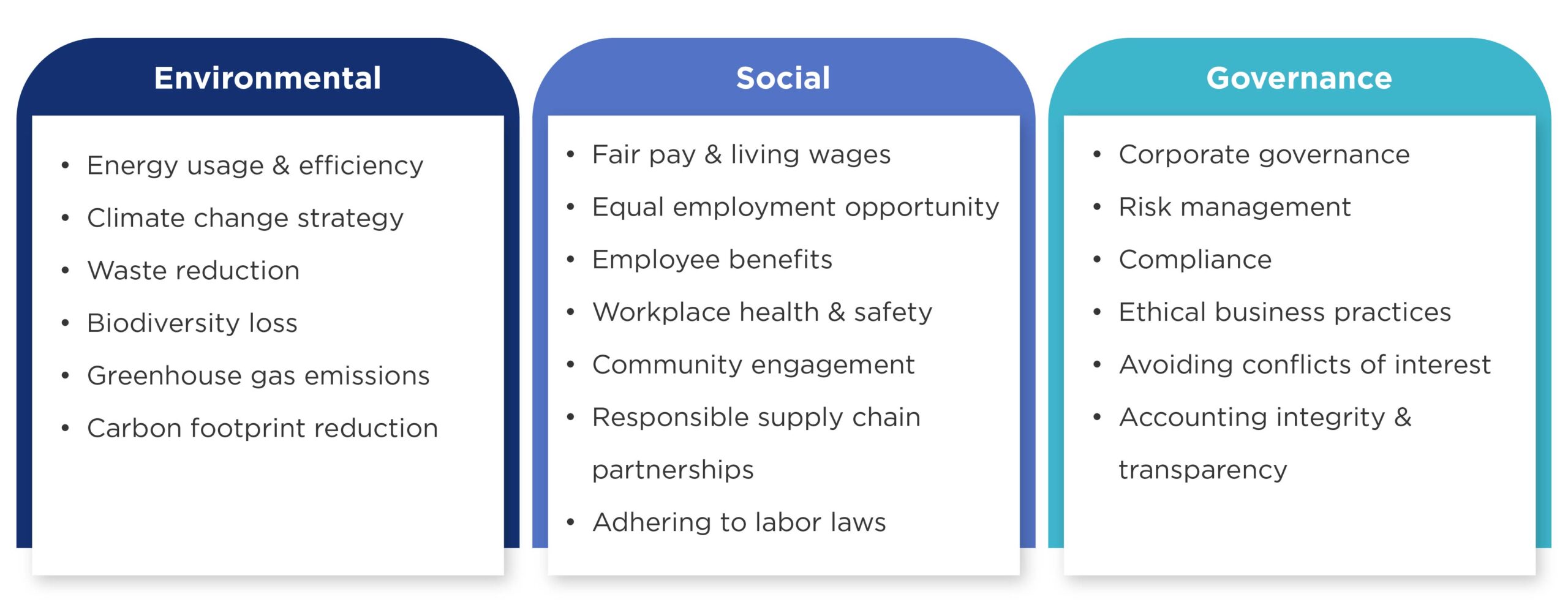
Environmental, social, and governance (ESG) has evolved from a moral imperative to a strategic thing for value creation. ESG will no longer be the domain of listed companies; it’s for every business that not only wants to do the right thing but knows that ESG is one of the smartest financial decisions it can make.
ESG accounting services have become essential for businesses handling modern stakeholder expectations. Organisations that overlook ESG can soon be considered financially out of touch.
What is ESG Reporting in Accounting?
ESG reporting integrates environmental, social, and governance factors into traditional financial reporting. This approach provides stakeholders with comprehensive insights into a company’s sustainable performance.
Your business, like every business, is deeply intertwined with environmental, social, and governance (ESG) concerns. The three pillars include:
Environmental criteria
- Energy consumption and carbon emissions
- Waste management and resource efficiency
- Climate risk reporting and environmental impact
Social criteria
- Labour relations and diversity inclusion
- Community engagement and stakeholder relationships
- Social impact reporting across supply chains
Governance
- Internal controls and compliance systems
- Stakeholder-driven accounting practices
- Transparency and ethical business conduct

The business case for ESG Strategy in Accounting
Below is the business case for ESG strategy in accounting, you can find them all below:
Five ways ESG creates value
A strong ESG proposition correlates with higher equity returns, from both a tilt and momentum perspective. Research demonstrates five key value creation mechanisms:
| Value Creation Area | Business Impact | Example Benefits |
|---|---|---|
| Top-line Growth | Revenue expansion | New market access, customer preference |
| Cost Reductions | Operating efficiency | Lower energy costs, waste reduction |
| Regulatory Benefits | Strategic freedom | Reduced interventions, government support |
| Employee Productivity | Human capital | Higher motivation, talent attraction |
| Investment Optimisation | Capital allocation | Better long-term returns, asset efficiency |
Financial performance correlation
The overwhelming weight of accumulated research finds that companies that pay attention to environmental, social, and governance concerns do not experience a drag on value creation- in fact, quite the opposite.
Studies of over 2,000 research papers show:
- 63% demonstrate positive financial impact
- Only 8% show negative correlation
- ESG reduces downside risk through lower default rates
Understanding Sustainability reporting framework
Understanding sustainibility reporting framework is important, below you can get full understanding of it:
Frameworks vs Standards
ESG reporting frameworks are more about principles. This focus on the bigger questions, such as how information is structured, what information is collected, etc.
ESG reporting standards are more technical. They give specific requirements, like precise metrics for reporting each topic.
Common Frameworks
| Framework | Focus Area | Key Features |
|---|---|---|
| TCFD | Climate-related disclosures | Financial risk assessment |
| GRI | Comprehensive ESG | Broad sustainability coverage |
| IIRC | Integrated reporting | Value creation narrative |
| CDSB | Climate disclosure | Environmental standardisation |
Major Standards
- IFRS S1 & S2: Global sustainability standards
- SASB Standards: Industry-specific metrics
- EFRAG Standards: European CSRD compliance
CSRD requirements for UK firms in 2025
Despite Brexit, UK companies with significant EU operations face CSRD reporting obligations. Beginning this year, companies in over 60 countries, from Australia to Zambia, will gradually produce their first sustainability reports under the unified IFRS S1 and S2 standards.
Key requirements include:
- Double materiality assessment
- Comprehensive ESG disclosure UK 2025
- Third-party assurance requirements
- Digital reporting formats
Corporate sustainability disclosure UK
UK firms must navigate:
- Non-financial reporting requirements
- Climate risk reporting mandates
- Stakeholder engagement documentation
- Integrated ESG reporting practices
Environmental Accounting Practices
Below is the environmental Accounting practices, you can spot them below:
Practical implementation
Consider 3M, which has long understood that being proactive about environmental risk can be a source of competitive advantage. The company has saved $2.2 billion since introducing its “pollution prevention pays” (3Ps) program.
Best practices include:
- Energy and water consumption tracking
- Waste reduction and circular economy principles
- Carbon footprint measurement and reduction
- Supply chain environmental monitoring
Cost benefits
Environmental accounting delivers measurable returns:
- Resource efficiency improvements
- Waste disposal cost reductions
- Energy consumption optimisation
- Regulatory compliance cost management
The role of technology in ESG Reporting
Technology plays a very important role in ESG reporting and are stated below:
Data management
But at the heart of it all lies data. If you don’t have a deep understanding of the data that underpins your approach, your ESG is vacuous and will simply smack of greenwashing!
One of the most crucial developments in ESG reporting will be the development of AI and data extraction algorithms. Without accurate, real-time data there can be no ESG.
Technology solutions include:
- Automated data collection systems
- Real-time monitoring platforms
- AI-driven analytics
- Integrated reporting software
Quality assurance
Ensuring data integrity requires:
- Regular auditing processes
- Third-party verification
- Consistent measurement protocols
- Transparency in methodologies
Investment flows
Global sustainable investment now tops $30 trillion up 68 percent since 2014 and tenfold since 2004.
Green finance opportunities include:
- Sustainability-linked loans
- Green bonds and financing
- ESG investment funds
- Impact investing vehicles
Credit Benefits
Credit rating agencies, which trace their origins back to John Moody’s 1909 ratings of US railroads and once focused solely on financial fundamentals, have expanded their methodologies to recognise the direct impact of ESG factors.
Benefits include:
- Lower borrowing costs
- Enhanced credit ratings
- Preferential lending terms
- Access to green financing
Why Accountants should offer ESG advisory Services?
Below we have mentioned some of the reasons why accountants offer ESG advisory services:
Market Demand
More and more investors are incorporating ESG elements into their investment decision making process, making it increasingly important from the perspective of securing capital, both debt and equity.
Opportunities for accountants:
- ESG strategy development
- Sustainability reporting preparation
- Data management and analysis
- Assurance services provision
Skill Development
Key competencies include:
- Understanding regulatory frameworks
- Data analytics capabilities
- Stakeholder engagement skills
- Sustainability knowledge
Difference between ESG and Sustainability reporting
Below you can understand the difference between ESG and Sustainability reporting:
Scope and Focus
While sustainability reporting covers broader environmental and social impacts, ESG reporting focuses specifically on material business risks and opportunities.
| Aspect | ESG Reporting | Sustainability Reporting |
|---|---|---|
| Purpose | Investor-focused | Stakeholder-focused |
| Scope | Material issues | Comprehensive impact |
| Audience | Financial markets | Broader community |
| Standards | Financial frameworks | Various guidelines |
Integration Approach
At Johnston Carmichael, we believe sustainability is the moral compass which sets out a broad set of principles to which an organisation should aspire and ESG is the reporting framework which brings that sustainable ambition to life.
Common obstacles
- Data quality and availability
- Resource constraints
- Regulatory complexity
- Stakeholder alignment
Practical solutions
ESG reporting must not be treated simply as a compliance exercise. By collecting the data, you are taking the first steps towards managing ESG issues meaningfully and in the same manner you would manage financial issues.
Implementation strategies:
- Phased approach to data collection
- Technology investment prioritisation
- External expertise utilisation
- Stakeholder communication planning
Conclusion
ESG is not only a business imperative – it makes sense from a moral, ethical and climate change perspective. Doing the right thing has never made more business sense.
Sustainable accounting through ESG reporting represents a fundamental shift towards integrated value creation. Businesses that embrace comprehensive ESG accounting services position themselves for long-term success.
The convergence of regulatory requirements, investor expectations, and operational benefits makes ESG integration essential. Whether implementing basic sustainability reporting frameworks or advanced ESG disclosure UK 2025 requirements, companies must act decisively.
Success requires commitment to data quality, stakeholder engagement, and continuous improvement. The journey towards sustainable accounting excellence begins with understanding that ESG reporting is not just compliance it’s strategic advantage.
Frequently Asked Questions
What is ESG reporting in accounting?
How can small businesses start ESG reporting?
1. Conducting a simple baseline assessment
2. Identifying material issues for their industry
3. Implementing basic data collection processes
4. Using affordable technology solutions
6. Focusing on gradual improvement rather than perfection
What are CSRD requirements for UK firms in 2025?
What’s the difference between ESG and sustainability reporting?
Why should accountants offer ESG advisory services?
Growing investor demand for ESG information
Regulatory requirements increasing
Competitive advantage for firms
Natural extension of financial advisory skills
Significant market opportunity for revenue growth
How does ESG create business value?
What are the main ESG reporting frameworks?
How important is data quality in ESG reporting?
What role does technology play in ESG accounting?
How does green finance relate to ESG reporting?
Parul is a content specialist with expertise in accounting and bookkeeping. Her writing covers a wide range of accounting topics such as payroll, financial reporting and more. Her content is well-researched and she has a strong understanding of accounting terms and industry-specific terminologies. As a subject matter expert, she simplifies complex concepts into clear, practical insights, helping businesses with accurate tips and solutions to make informed decisions.

